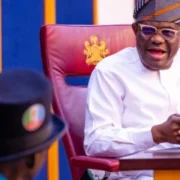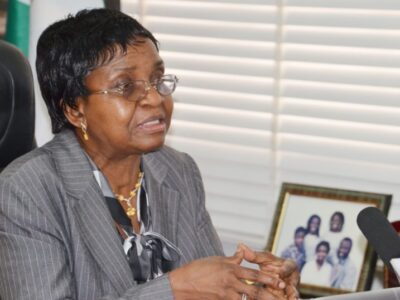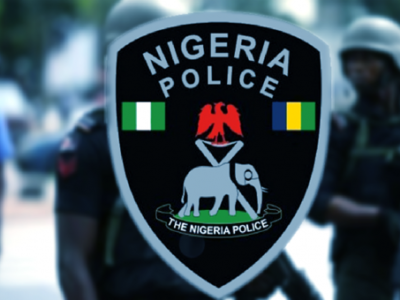The forensic examination of a mobile phone at the center of the $4.5 billion fraud trial involving former Central Bank of Nigeria (CBN) Governor, Godwin Emefiele, has hit a deadlock following a heated dispute between the Economic and Financial Crimes Commission (EFCC) and the defence team over how to execute the court-ordered test.
At Thursday’s hearing before Justice Rahman Oshodi of the Ikeja Special Offences Court, both parties traded blame for the failure of the forensic process, which was scheduled for September 24 and 25, 2025.
Emefiele and his co-defendant, Henry Omoile, are facing a 19-count charge bordering on alleged fraud, corruption, and abuse of office.
The EFCC had earlier presented an iPhone 12, said to contain WhatsApp messages, as part of its evidence against the embattled former apex bank chief. The court had directed that the phone, tagged “iPhone 2,” be subjected to a joint forensic analysis by experts representing both sides to verify the authenticity of the WhatsApp conversations in contention.
However, defence counsel, Olalekan Ojo (SAN), told the court that the test could not proceed because the EFCC allegedly obstructed access to the device.
“The first obstacle was the EFCC’s insistence that the device could not be fully exposed to our team. On the second day, even after the Registrar confirmed that the order covered both the phone and its WhatsApp contents, EFCC officials refused to produce it when the Apple expert requested it,” Ojo said, urging the court to compel the commission to comply fully with its order.
In response, EFCC’s counsel, Rotimi Oyedepo (SAN), dismissed the allegation as misleading, claiming the defence compromised procedure by connecting the exhibit to the internet during the analysis — a move he said could alter or corrupt digital evidence.
“The prosecution has never — and will never — prevent the defence from accessing the device. Our only demand is that the process must follow proper forensic standards to preserve the integrity of the evidence,” Oyedepo said.
The defence lawyers insisted that proceedings should be halted until the forensic report is completed, arguing that the disputed WhatsApp chats are crucial to their case.
Justice Oshodi, after listening to both sides, directed the EFCC to file its forensic report within 24 hours but allowed the prosecution’s witness, who had travelled from Abuja, to testify.
He also ordered both parties to adopt electronic filing and service of documents to prevent further delays in the high-profile case.




















Comments